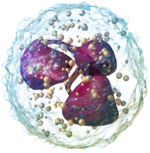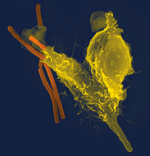immunology wars
may your immune system defend you
Neutrophils

Neutrophils are a relatively short-lived cell that circulate in the blood and are the first white blood cells to be recruited to sites of injury or infection. Neutrophils are phagocytes, meaning that they engulf and destroy pathogens or damaged cells; being the most abundant type of immune cell in the blood, they play a key role in the innate immune response against many different types of infection. After engulfing a pathogen neutrophils rapidly die via a process called apoptosis, or programmed cell death. They do this to prevent any damage to surrounding tissues and their dead neutrophils are a large component of pus.
Not only do neutrophils help clear the threat themselves, they also release a wide array of chemical messengers called cytokines and chemokines, which recruit other cells of the immune system to the inflammatory site, including dendritic cells, B- and T-lymphocytes and Natural Killer cells. Neutrophils therefore play a pivotal role in the immune response.

Source: Blausen Medical (CC)

Source: NIAID (CC)
Individuals with too few neutrophils, a condition known as neutropenia are susceptible to infections as they are unable to fight off the pathogens effectively.
Cells
- Basophils
- Eosinophils
- Mast Cells
- Neutrophils
- Monocytes / Macrophages
- Natural Killer Cells
- Dendritic Cells
- B-Lymphocytes
- T-Lymphocytes
- CD4+ T-Lymphocytes
- CD8+ T-Lymphocytes
- Regulatory T-lymphocytes
- Th17 Lymphocytes
